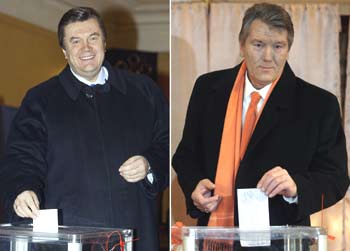 Ukraine’s pro-western president Viktor Yushchenko has been defeated in the presidential election leaving opposition leader Viktor Yanukovich and Prime Minister Yulia Tymoshenko to compete in a run-off ballot. Yanukovich led in first round of voting with 36.6 percent of the vote, while Tymoshenko picked up 25.8 percent, according to an exit poll conducted by local television channel Inter. The incumbent got only 5.2 percent leaving him in fifth place behind Sergei Tigipko, a former economy minister, who gained 13.5 percent. About two thirds of Ukraine’s voters turned out to vote. It will be ten days before the Central Election Commission releases official results but there is no doubt who will be in the run-off on 7 February.
Ukraine’s pro-western president Viktor Yushchenko has been defeated in the presidential election leaving opposition leader Viktor Yanukovich and Prime Minister Yulia Tymoshenko to compete in a run-off ballot. Yanukovich led in first round of voting with 36.6 percent of the vote, while Tymoshenko picked up 25.8 percent, according to an exit poll conducted by local television channel Inter. The incumbent got only 5.2 percent leaving him in fifth place behind Sergei Tigipko, a former economy minister, who gained 13.5 percent. About two thirds of Ukraine’s voters turned out to vote. It will be ten days before the Central Election Commission releases official results but there is no doubt who will be in the run-off on 7 February.Viktor Yushchenko’s crushing defeat was not unexpected after period of legislative deadlock, lagging reforms and economic doldrums. But it represents an end to the Orange Revolution which began in the last presidential election in 2004 when he was poisoned with dioxin. Both Yanukovich and Tymoshenko have signaled a return to pro-Russian politics. Both run-off candidates have also said they will abandon efforts for Ukraine to join NATO.
Russia remains the truculent big brother to which any winner will need to answer to. They curbed natural-gas deliveries to Ukraine three times in the last five years, withheld a new ambassador to Kiev and accused Yushchenko of supplying arms to Georgia during the war with Russia in August 2008. Fyodor Lukyanov, editor of Russia in Global Affairs magazine, called the first round result a “win-win situation” for his country. “Whoever becomes the next president will be much less ideological and more businesslike,” he claimed.
At first glance Yulia Tymoshenko does not seem like a natural Russian ally as a close confederate of Yushchenko during the Orange Revolution. Like Yushchenko her power base is in the west of the country. Her election priorities were a fairer society and more government efficiency, and she also pledged innovation-driven economic reform and better welfare provisions. But she has forged a close relationship with Vladimir Putin who personally negotiated an end to last year’s gas cut with her.
Apparently believing herself to be the reincarnation of Eva Peron, Tymoshenko claimed her biggest success during her two year tenure as Prime Minister was leading Ukraine out of financial crisis. She told Ukrainian TV last week the country has come out of the GFC “stronger, not shattered, not in pieces, not devoid of blood, or lost," She said her government had renewed the aviation industry, built a new hydroelectric station, and led the way with agriculture production. “[We] managed to reach leading positions in the agrarian sector in the world...[and] did not let the agrarian sector to drop its production even half a percent,” she said. “We are building what is needed for the Euro 2012.We modernized factories. Yes, it was difficult, but during a crisis, things are difficult."
But despite Tymoshenko’s rhetoric, Viktor Yanukovich remains the favourite to become the next president. He is a two time prime minister taking the role first from 2002-2004. This was the springboard to the presidential campaign of 2004 in which he was backed by Russia and early results gave him a victory. His win was then thrown out by the courts after street protests and he was condemned for fraud and abuse of power. But Yanukovich wasn’t finished as a political force. He bounced back two years later to regain the Prime Ministership in 2006 and is now is benefiting from disappointment with Yushchenko's failure to stop bickering with his supposed allies including Tymoshenko.
Yanukovich draws most of his support from the Russian-speaking areas of the industrial east and the south. He has promised an economic revival, new jobs, pay raises, judicial reforms and tax-free policies for small enterprises for five years. Yanukovich is a Russian speaker with only halting ability in Ukrainian. But he is no longer the Russian lapdog he was five years ago. Since 2004 Ukraine has effectively created a distinct new national consciousness by banning Russian on national television and in university entrance exams.
The runoff election will be tight and the role of third placed Sergei Tigipko will be vital. As well as being an economic minister, Tigipko was a central banker and a former adviser to both Yanukovych and Tymoshenko. Though officially staying neutral for now, he has in the past expressed interest in working as prime minister under either. He will probably be able to name his price to guarantee either candidate victory.

